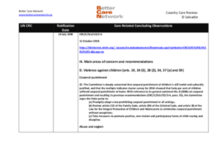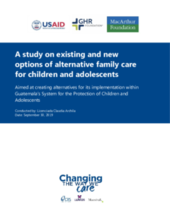This page contains documents and other resources related to children's care in the Americas. Browse resources by region, country, or category.
Displaying 521 - 530 of 1438
This chapter examines how the competing goals of child welfare systems work with the developments in constitutional rights.
The current study examines social networks and utilization of social support among young people ages 18 to 25 from one southeastern state in the US who had aged out of care or were in extended foster care.
The current study employed thematic analysis to explore Massachusetts foster youth’s academic challenges and supports through interviews with teachers, foster parents, former foster youth, and three individuals who were both teachers and foster parents.
Objectives of this study were twofold. To identify combinations of adverse childhood experiences that are associated with out of home placement (OOHP)—based on both duration of OOHP and change in actual placement during each time point, among welfare involved youth. The second objective was to understand long-term negative outcomes during adolescence that are associated with greater placement instability.
Based on semi-structured interviews with parents involved with child protective services (CPS), this study explored these parents’ self-identified parenting strengths in light of their family-of-origin experiences.
In this article, the authors analyse how interventions of the State may undermine, rather than activate, the caring capabilities of vulnerable families across the life course, drawing on examples from Australia, England and the USA.
This country care review includes the care related Concluding Observations adopted by the Committee on the Rights of the Child and the Committee on the Rights of Persons with Disabilities as part of its examination of El Salvador's initial reports, as well as other care-related concluding observations, ratification dates, and links to the Universal Periodic Review and Hague Intercountry Adoption Country Profile.
This report from Changing the Way We Care reviews the range of available alternative care options in Guatemala and offers recommendations for additional alternative care modalities as well as deinstitutionalization and family preservation practices.
Since 2017, The Chronicle of Social Change has been working to build the first public resource on foster care capacity in the United States, through the Who Cares project which collects data directly from each state, and combines it with specially obtained federal reports. This executive summary provides and overview of methodology and findings of the Who Cares project for 2019.
This study aimed to assess differences in the level of post-traumatic symptoms reported by those who experienced commercial sexual exploitation of children (CSEC) during adolescence and those who did not.



